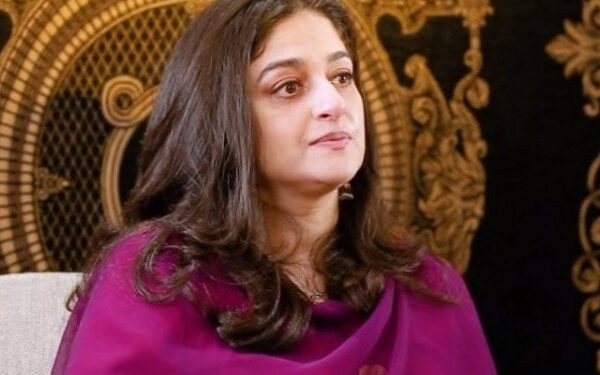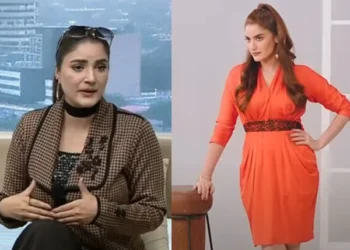LAHORE – Acclaimed Pakistani actress and social activist Nadia Jamil has issued a public clarification regarding a misunderstood statement she made in a recent social media post. The viral video, in which she spoke about wives not becoming “mothers” to their husbands, sparked widespread debate online and led to misconceptions about her stance on marital roles and responsibilities.
Nadia Jamil, known for her thought-provoking views, philanthropy, and strong presence in the entertainment industry, took to Instagram to explain the real meaning behind her statement, asserting that it was taken out of context and misinterpreted by many.
Background: What Sparked the Controversy?
The controversy began when a video clip of Nadia Jamil went viral on social media. In the clip, Nadia is heard saying:
“Girls should not become mothers to their husbands and husbands should not expect their wives to take care of them like a mother. They should do whatever they want.”
This statement, while brief, ignited a wave of reactions across platforms like Instagram, X (formerly Twitter), and Facebook. Many interpreted her words as a rejection of traditional roles in marriage, particularly the concept that a wife should care for her husband emotionally and physically, similar to how a mother tends to her child.
Critics accused her of undermining the caring and nurturing roles wives often play in South Asian marital dynamics, while supporters argued that she was merely advocating for mutual respect and adult accountability in relationships.
Nadia Jamil’s Clarification: Not Against Caring, Just Against Infantilization
In response to the controversy, Nadia issued a clarifying statement on Instagram, aiming to address the misunderstanding and restore balance to the public discourse surrounding her video.
“No one can, nor should they. The way a husband and wife take care of each other is different. They are equal partners, but a mother’s upbringing is something unique and irreplaceable.”
Nadia emphasized that her message was never about discouraging love or support in a marriage, but about challenging the toxic cultural expectations that expect women to parent their husbands, a role that can become emotionally exhausting and psychologically damaging.
She elaborated that marriage should be built on partnership, equality, and mutual care, not on one partner playing a parental role while the other remains emotionally dependent.
Understanding the Cultural Context of the Debate
In South Asian societies, including Pakistan, traditional gender roles in marriage are deeply entrenched. Women are often expected to not only be wives but also act as:
- Emotional caretakers
- Household managers
- Mothers to their children and sometimes to their husbands
This phenomenon, referred to informally as “emotional labor,” often leads women to suppress their own needs in order to keep their families functioning. Nadia Jamil’s statement was a bold attempt to challenge this norm and promote the idea that adult men must take responsibility for their emotional and physical needs, instead of relying on their wives to mother them.
Mutual Care vs. Mothering: A Key Distinction
In her clarification, Nadia highlighted an important distinction between mutual spousal care and mothering behavior. While partners in a marriage should look after one another, care for each other’s well-being, and support each other through hardships, the dynamics of care should not mimic a parent-child relationship.
She stated:
“My husband and I take care of each other. We’re partners in life, but we don’t parent each other. That’s not what marriage is meant to be.”
This message resonates with modern feminist perspectives on emotional equity in relationships, which stress that both partners should contribute equally to emotional work, rather than placing the entire burden on the woman.
Public Reaction: Divided Opinions and Meaningful Dialogue
Nadia’s original statement and her clarification have both stirred significant engagement from the public. Social media platforms have been flooded with opinions, with reactions ranging from strong agreement to harsh criticism.
Supporters Said:
- “Finally, someone is talking about how exhausting it is for women to be mothers to grown men in marriage.”
- “Nadia is right. Men should learn to manage their own responsibilities and not expect their wives to do everything.”
- “Mutual care is beautiful. Expecting women to act like mothers is not.”
Critics Claimed:
- “She’s trying to destroy traditional family values.”
- “A wife taking care of her husband is natural—why make it sound bad?”
- “Our culture respects a wife’s role. Statements like these can be misleading.”
However, many neutral voices also welcomed the healthy debate, saying that the topic opened the door for more thoughtful conversations about gender roles, emotional support, and mutual respect in modern marriages.
Nadia Jamil: More Than Just an Actress
Nadia Jamil’s voice carries weight beyond showbiz. She is a survivor of abuse and cancer, an advocate for children’s rights, and a vocal critic of patriarchy and societal double standards. Her statements often reflect a deep concern for mental health, gender equality, and women’s empowerment in Pakistan.
In interviews and public posts, she has consistently championed the idea of healthy emotional boundaries, particularly in intimate relationships. Her clarification about the misunderstood Instagram post is just another chapter in her ongoing efforts to promote dignity and self-worth for women in all spheres of life.
The Importance of Healthy Boundaries in Marriage
Experts in relationship psychology agree with Nadia’s stance on setting clear emotional boundaries in marriages. They argue that:
- Over-parenting a partner leads to emotional burnout
- Codependency can erode mutual respect
- Adults need to take emotional responsibility for their actions
- Healthy relationships thrive on equality, not infantilization
Psychologist Dr. Ayesha Malik states:
“It’s important for spouses to support one another, but not to the extent where one becomes emotionally overburdened. Emotional labor should be shared, and expectations should be realistic.”
A Call for Rethinking Relationship Norms
Nadia Jamil’s statement, while initially misunderstood, shines a light on a very real issue that many couples face: unbalanced emotional roles. Her call to avoid turning marriage into a parent-child dynamic encourages couples to:
- Rethink their expectations of each other
- Set healthy emotional and personal boundaries
- Embrace mutual support without self-sacrifice
- Learn that love doesn’t require losing one’s identity
In a society that still clings tightly to gender stereotypes, her words serve as a powerful reminder to challenge outdated expectations and create more equal and nurturing relationships.
Conclusion: A Clarified Message Worth Discussing
While the viral video clip of Nadia Jamil’s statement created confusion and controversy, her subsequent clarification offered much-needed insight. Her intention was not to attack traditional values, but rather to encourage balanced, healthy, and respectful marital relationships where both partners care for one another as equals—not as parent and child.
In a culture where emotional labor often goes unrecognized, her message opens the door to important discussions about the mental and emotional well-being of women in marriages.
As conversations around mental health, gender roles, and mutual respect evolve in Pakistani society, Nadia Jamil’s brave and honest voice continues to spark dialogue and reflection—exactly what is needed in today’s changing world.

























